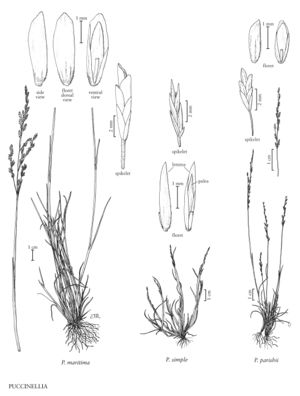Difference between revisions of "Puccinellia simplex"
FNA>Volume Importer |
FNA>Volume Importer |
(No difference)
| |
Revision as of 19:16, 24 September 2019
Plants annual; not mat-forming. Culms usually erect, 2-25 cm. Ligules 1-3 mm, acute to obtuse, entire; blades 0.7-2 mm wide, flat to involute. Panicles 1-18 cm, compact, mostly linear at maturity, primary branches usually spikelet-bearing to the base, lower branches erect; pedicels densely scabrous or with only a few scattered scabrules, often also with a few hairs, often with tumid epidermal cells. Spikelets 3.5-8 mm, with 2-7 florets. Glumes rounded to weakly keeled over the back, veins obscure to prominent, apices acute; lower glumes 1.3-2 mm; upper glumes 2.3-3 mm; calluses hairy; lemmas 2.5-4 mm, mostly herbaceous, usually with about 0.1 mm hairs distributed sparsely and evenly between the veins, longer hairs also usually present along the veins and near the base, basal hairs often longest, twisted and tangled, backs rounded, sometimes keeled distally, 5-veined, veins usually obscure, sometimes prominent, midveins sometimes reaching the margins, other veins usually not doing so, apical margins often hyaline, smooth or with a few scattered scabrules, apices acute, entire; palea veins with hairs, hairs on the proximal portion longer, twisted and somewhat tangled, hairs on the distal 2/3 usually short and straight; anthers 0.2-0.5 mm. 2n = 56.
Discussion
Puccinellia simplex is widespread in, and mostly confined to, saline soils of central California. The records from Utah probably reflect introductions.
Selected References
None.
